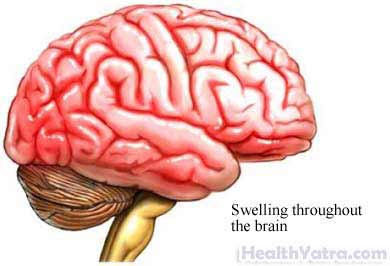Definition
Encephalitis is inflammation of the brain. Certain mosquito-borne viruses can lead to encephalitis. Examples of these viruses include:
- West Nile encephalitis
- Eastern equine encephalitis
- Western equine encephalitis
- St. Louis encephalitis
- La Crosse encephalitis
- Japanese encephalitis
- Venezuelan equine encephalitis
Causes
The most common cause is being bitten by an infected mosquito. There are other, rarer causes, such having a blood transfusion with infected blood.
Risk Factors
The greatest risk factors are spending time in areas where mosquitoes are present and not using insect repellent.
People who are age 50 years and older and those with a weakened immune system have a higher risk of developing serious symptoms.
Symptoms
Most people who become infected with one of these mosquito-borne viruses do not develop any symptoms.
If symptoms do occur, they are generally mild and may include flu-like symptoms, such as:
- Headache
- Fever
- Chills
- Fatigue
- Joint and muscle pain
- Vomiting
While rare, a small percentage of people develop encephalitis and have serious, life-threatening symptoms, such as:
- High fever
- Disorientation
- Vision loss
- Paralysis
- Seizures
- Coma
Diagnosis
In addition to taking your medical history and doing a physical exam, your doctor will ask you:
- What kind of symptoms you are experiencing
- Where you have been living or traveling to
- Whether you have been exposed to mosquitoes
A blood test is commonly used to confirm the diagnosis of a mosquito-borne virus. Depending on the symptoms that you have, your doctor may order other tests, such as:
- MRI scan —a test that uses magnetic waves to make pictures of structures inside the head
- CT scan —a type of x-ray that uses computers to make pictures of structures inside the head
- Cerebrospinal fluid analysis
Treatment
Treatment focuses on supportive care, such as taking pain relieving medicines and replenishing fluids so that you are not dehydrated.
Severe symptoms require hospitalization, which may include:
- Mechanical ventilation (breathing support)
- Fluids given intravenously (through a vein in your arm)
- Medicine to control seizures
- Medicine to decrease brain swelling
Prevention
The best way to reduce your chances of getting mosquito-borne viral encephalitis is to avoid being bitten by mosquitoes. Steps that can help include:
- Limiting outside activities where mosquitoes are present
- Wearing long sleeve shirts and long pants at dusk and dawn, when mosquitoes are most active
- Using bug repellent that contains DEET
- Emptying sources of standing water around the home, such as bird baths and gutters, where mosquitoes may breed
- Repairing screens on your windows and doors to prevent mosquitoes from getting into your house
Mosquitoes can contract viruses by biting infected birds. If you see a dead bird, call the public health department. Do not touch the dead bird unless you are wearing disposable gloves.

